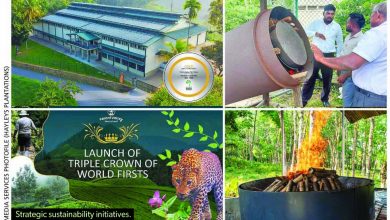YOUTH FORUM


Compiled by Nicola Jayasundera
WINGS ON THE WAY FORWARD
Omar Naleem sees a thriving economy where responsible tourism flourishes
Q: What’s the good, the bad and the ugly here in Sri Lanka?
A: Sri Lanka is a land with a vibrant culture, breathtaking landscapes and resilient people. Its rich tapestry is woven with diverse ethnicities, religions and traditions. The Sinhalese, Tamil, Muslim and Burgher communities blend seamlessly to create a lively cultural landscape.
Nevertheless, the island’s recent history was marred by a brutal civil war that lasted nearly three decades. And the armed conflict left deep fissures in the nation’s social fabric as it displaced people and hindered economic progress.
Economically, Sri Lanka has been grappling with poverty, unemployment and high national debt. The recent economic crisis, which was exacerbated by the COVID-19 pandemic, caused hardships for many. Corruption and political instability has also hindered the nation’s development.
Sri Lanka is also a hotspot for climate change. Rising sea levels threaten coastal communities and erratic weather patterns disrupt agriculture, which is a significant contributor to the island’s economy. Deforestation is another pressing concern that is jeopardising the biodiversity and ecological balance of the environment.
Social inequalities also linger. The gap between the rich and poor remains wide, and access to quality education and healthcare varies greatly depending on one’s socioeconomic background. Gender disparity is another challenge with many women facing limitations in terms of access to education, employment and leadership opportunities.
 Q: And what are the challenges facing the country today?
Q: And what are the challenges facing the country today?
A: Sri Lanka’s path is littered with challenges. Achieving a lasting peace necessitates addressing the legacy of the civil war through truth seeking mechanisms and ensuring justice for victims.
Economic growth must be inclusive and sustainable, and focussed on sectors such as tourism, agriculture and renewable energy.
Q: Do you believe that Sri Lanka will be united one day – and how, if so?
A: Sri Lanka boasts a strong spirit of resilience, and the people are resourceful and optimistic. When harnessed effectively, its diverse cultural tapestry can be a source of unity.
Efforts to promote inter-ethnic dialogue and build bridges between communities offer hope for a more inclusive future.
Q: Where do you see yourself in 10 years?
A: My primary focus is to serve my alma mater, foster a positive learning environment, and promote academic excellence and personal development.
I envision several potential paths for my future that include leadership in education, public service, entrepreneurship, continuous learning and professional development, and advocacy and activism.
While the exact path may hold unforeseen twists and turns, I aspire to remain steadfast in my commitment to having a positive impact on my community and beyond.
Q: And where do you see Sri Lanka in a decade from today?
A: Sri Lanka could be a transformed nation in a decade.
I see a thriving economy where tourism flourishes alongside sustainable development practices while renewable energy powers homes and industries, and reduces our dependence on fossil fuels.
Technological advancements will streamline education and healthcare delivery to ensure equitable access for all.
Q: Who is responsible for climate change and global warming – and what must be done about it?
A: Climate change demands a global response.
Investing in renewable energy infrastructure, adopting sustainable agricultural practices and promoting responsible consumption are crucial steps towards a greener future.
Q: How do you view the growing importance of social media today?
A: Social media has become a powerful tool to connect and communicate; it provides a platform for sharing information, raising awareness on social issues and fostering global communities.
However, concerns exist regarding the spread of misinformation, social comparisons and the potential for manipulation.
The future of social media lies in fostering its responsible use. Individuals must be critical consumers of information, and platforms need to implement strict regulations against hate speech and misinformation campaigns.
Q: And finally, where do you see the world in 10 years?
A: A glimpse into the future of the world in 2034 reveals a landscape shaped by technological advancements and interconnectedness. AI may play a more significant role in everyday life by automating tasks and assisting with decision making.
Global cooperation on issues such as climate change and resource management will be essential. And international organisations will need to work together to promote sustainable development, and ensure a just and equitable future for all.






